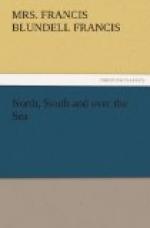“I al’ays thought as we’d keep Blackbird so long as he did live,” murmured Mrs. Bold, half convinced but still lamenting, “seein’ as we did breed en and bring en up ourselves, and he did work so faithful all his life. Poor wold Jinny! He wur her last colt, and you did al’ays use to say you’d keep en for her sake. Ah, ’tis twenty year since I run out and found en aside of her in the paddock—walkin’ about as clever as you please, and not above two hours old. Not a white hair on en—d’ye mind?—and such big, strong legs! I was all for a-callin’ en Beauty, but you said Beauty was a filly’s name. And he did use to run to paddock-gate when he wur a little un, and I wur a-goin’ to feed chicken—he’d know my very foot, and he’d come prancin’ to meet I, and put his little nose in the bucket. Dear, to be sure, I mind it just so well as if it wur yesterday!”
The farmer laughed and stroked his beard.
“‘E-es, he was a wonderful knowin’ colt,” he agreed, placidly. “There’s a deal o’ sense in beasts if ye take notice on ’em and treat ’em friendly like. Them little lambs as we did bring up to-year was so clever as Christians, wasn’t they? Ye mind the little chap we did call Cronje, how he used to run to I when he did see I a-comin’ wi’ the teapot? And Nipper—ye mind Nipper? He didn’t come on so well as the others; he was sickly-proud, so to speak, and wouldn’t suckey out o’ the teapot same as the rest. But he knowed his name so well as any o’ them, and ’ud screw his head round, and cock his ears just as a dog mid do, when I did call en. Pigs, even,” he proceeded meditatively, “there’s a deal o’ sense in pigs, if ye look for it. Charl’, ye mind Charl’, what he had soon after we was married? That there pig knowed my v’ice so well as you do. What I did use to come into the yard and did call ‘Charl’,’ he’d answer me back, ‘Umph.’ Ho! ho! I used to stand there and laugh fit to split. Ye never heard anythin’ more nat’ral. ‘Charl’,’ I’d call; ‘Umph’ he’d go. Ho! ho! ho!”
The woman did not laugh; she was screwing up her eyes in the endeavour to penetrate the darkness of the stable. “Poor wold Blackbird,” she said, “I wish it hadn’t come to this. It do seem cruel someway. There, he did never cost ’ee a penny, wi’out ’twas for shoes, and he’ve a-worked hard ever sin’ he could pull a cart—never a bit o’ vice or mischief. It do seem cruel hard as he shouldn’t end his days on the place where he was bred.”
“My dear woman,” said her husband loftily, “what good would it do the poor beast to end his days here instead of up yonder? He’s bound to end ’em anyways, and we are twenty-two shillin’ the better for lettin’ of en go to the kennels.”
“Twenty-two shillin’?” repeated his wife.
“’E-es, not so bad, be it? The pore fellow’s fair wore out, but still, d’ye see, he fetches that at the last, and ‘tis better nor puttin’ an end to en for nothin’. Ah, there be a deal o’ money in twenty-two shillin’!”




